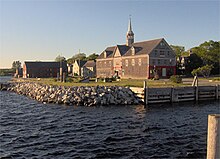LIMSwiki
Contingut

Els Loyalists (lleialistes) eren els colonitzadors d'origen britànic de les tretze colònies de l'Amèrica del Nord que van romandre lleials a la Monarquia Britànica arran del procés d'independència política dels Estats Units respecte del Regne Unit. En aquells temps sovint rebien el nom de Tories, Royalists, o King's Men. S'oposaven als patriotes de la Revolució Americana els quals donaven suport a la revolta contra els britànics. Quan la causa dels loyalists va ser vençuda, un 20% dels Loyalists marxaren cap altres parts de l'Imperi Britànic, a la mateixa Gran Bretanya o altres parts de l'Amèrica Britànica, especialment a l'Alt Canadà i Nova Brunswick, on van rebre el nom de United Empire Loyalists. La majoria van ser compensats econòmicament amb terres al Canadà o amb diners britànics distribuïts d'una manera formal.[1]
Els historiadors han estimat que al voltant del 15 al 20 per cent de la població europeo-americana de les colònies eren Loyalists.[2]
Immigració

La gran majoria dels Loyalists blancs (450.000–500,000) van romandre allà on vivien abans de la guerra d'independència. A principi de la dècada de 1780 només una petita part dels que van emigrar van tornar als Estats Units.
A partir del final de la guerra, el 1783, els Loyalists (especialment els soldats i oficials) van poder escollir ser evacuats. Els que tenien més lligams amb la vida al Nou Món eren més propensos a romandre als Estats Units.[3]
Aproximadament del 10 al 15% emigraren (uns 62.000 Loyalists blancs, que representava un 2% del total de la població dels Estats Units que era de 3 milions de persones l'any 1783).
Uns 46.000 anaren a l'Amèrica del Nord Britànica (actualment el Canadà). D'entre ells 34.000 a Nova Escòcia, 2.000 a l'illa del Príncep Eduard i 10.000 a Ontario. 7.000 arribaren a la Gran Bretanya i 9.000 a les Bahames i les colònies britàniques del Carib.[4] Els 34.000 que van emigrar a Nova Escòcia no van ser ben rebuts per la població local d'origen anglès, en resposta a això a partir d'ells es va crear Nova Brunswick, que fins 1784 formava part part de Nova Escòcia. Dels 46.000 loyalists que marxaren al Canadà, 10.000 anaren a la província del Quebec.
Milers d'iroquesos i altres natius americans van ser expulsats de l'estat de Nova York i d'altres estats i es van haver de reubicar al Canadà. Un grup d'afroamericans loyalists que primer van emigrar a Nova Escòcia i hi van patir discriminació racial van marxar cap a Sierra Leone.
Notes
- ↑ Els exiliats van rebre uns ₤3 milions o un 37% de les seves pèrdues del govern britànic. Alguns Loyalists que romangueren als EUA van ser capaços de mantenir la seva propietat. Jack P. Greene and J. R. Pole, eds, A Companion to the American Revolution (2004) pp. 246, 399, 641-2
- ↑ Calhoon, "Loyalism and neutrality p. 235. L'historiador Robert Middlekauff estima que uns 500.000 colonitzadors o el 19 percent de la població van romandre lleials a la Gran Bretanya. Middlekauff (2005) pp. 563-564
- ↑ Lohrenz (1998)
- ↑ Canada, A People's History Volume 1
Bibliografia
- Bailyn, Bernard. The Ideological Origins of the American Revolution (2nd ed. 1992) pp 230–319.
- Bailyn, Bernard. The Ordeal of Thomas Hutchinson: Loyalism and the Destruction of the First British Empire (1974), full scale biography of the most prominent Loyalist
- Brown, Wallace. The King's Friends: The Composition and Motives of the American Loyalist Claimants (1966).
- Calhoon, Robert M. "Loyalism and neutrality" in Jack P. Greene and J.R. Pole, eds., The Blackwell Encyclopedia of the American Revolution (1991)
- Calhoon, Robert M. The Loyalists in Revolutionary America, 1760-1781 (1973), the most detailed scholarly study
- Calhoon, Robert M., Timothy M. Barnes and George A. Rawlyk, eds. Loyalists and Community in North America (1994).
- Doré, Gilbert. "Why The Loyalists Lost," Early America Review (Winter 2000) online, focus on ideology
- Jensen, Merrill; The New Nation: A History of the United States during the Confederation, 1781-1789 1950; detailed discussion of return of Loyalists, popular anger at their return; repeal of wartime laws against them
- Kermes, Stephanie. "'I Wish for Nothing More Ardent upon Earth, than to See My Friends and Country Again': The Return of Massachusetts Loyalists." Historical Journal of Massachusetts 2002 30(1): 30-49. ISSN 0276-8313
- Kerber, Linda. Women of the Republic: Intellect and Ideology in Revolutionary America (1997)
- Knowles, Norman. Inventing the Loyalists: The Ontario Loyalist Tradition and the Creation of Usable Pasts (1997) explores the identities and loyalties of those who moved to Canada.
- Lohrenz, Otto; "The Advantage of Rank and Status: Thomas Price, a Loyalist Parson of Revolutionary Virginia." The Historian. 60#3 (1998) pp 561+. online
- Middlekauff, Robert. "The Glorious Cause: The American Revolution, 1763–1789." (2005 edition)
- Moore, Christopher. The Loyalist: Revolution Exile Settlement. Toronto: McClelland and Stewart, (1994).
- Mason, Keith. “The American Loyalist Diaspora and the Reconfiguration of the British Atlantic World.” In Empire and Nation: The American Revolution and the Atlantic World, ed. Eliga H. Gould and Peter S. Onuf (2005).
- Nelson, William H. The American Tory (1961)
- Norton, Mary Beth. Liberty's Daughters: The Revolutionary Experience of American Women, 1750-1800 (1996)
- Norton, Mary Beth. "The Problem of the Loyalist--and the Problems of Loyalist Historians," Reviews in American History June 1974 v.2 #2 pp 226–231
- Peck, Epaphroditus; The Loyalists of Connecticut Yale University Press, (1934) online
- Potter, Janice. The Liberty We Seek: Loyalist Ideology in Colonial New York and Massachusetts (1983).
- Quarles, Benjamin; Black Mosaic: Essays in Afro-American History and Historiography University of Massachusetts Press. (1988)
- Smith, Paul H. "The American Loyalists: Notes on Their Organization and Numerical Strength," William and Mary Quarterly 25 (1968): 259-77. in JSTOR
- Van Tyne, Claude Halstead. The Loyalists in the American Revolution (1902) online
- Wade, Mason. The French Canadians: 1760-1945 (1955) 2 vol.
Font principal
- Crary, Catherine S., ed. Price of Loyalty: Tory Writings from the Revolutionary Era (1973)

















